One of the strategic pillars of Cellnex's ESG Master Plan is “Being a facilitator of social progress”. To this end, a series of actions to be carried out between 2021 and 2025 have been defined in the Plan. These actions aim to increase Cellnex's social contribution to society by financing or co-financing activities and programmes, and developing a variety of educational, social and cultural projects. they are all related to the challenges of the digital world where technology is the backbone, and to creating an open virtual space to share these projects with society.
As a result of the global crisis caused by the COVID-19 pandemic, Cellnex has developed the "Cellnex COVID-19 Relief Initiative", a €10 million fund to support national and international organisations and projects to help minimise the health, economic and social impact of the crisis during the period 2020-2022-
Half of the €10 million euro fund is intended to finance research undertaken by a European consortium of hospitals led by Clínic-IDIBAPS and Banc de Sang i Teixits in Barcelona, with the participation of IISGM-Hospital Universitario Gregorio Marañón in Madrid, the IRST-IRCCS in Meldola, INSERM-U1183 in Montpellier and the IRCCS-Hospital San Raffaele in Milan.
One of the keys to tackling COVID-19 is having a thorough understanding of the immune status of the population against the SARS-CoV-2 virus and the specific role of this immunity, i.e. the type of immunity and how long lasts. The aim of the project is therefore to measure the cellular responsiveness of the immune system to SARS-CoV-2 by detecting and obtaining T-lymphocytes that can act to combat COVID-19 in its various stages.
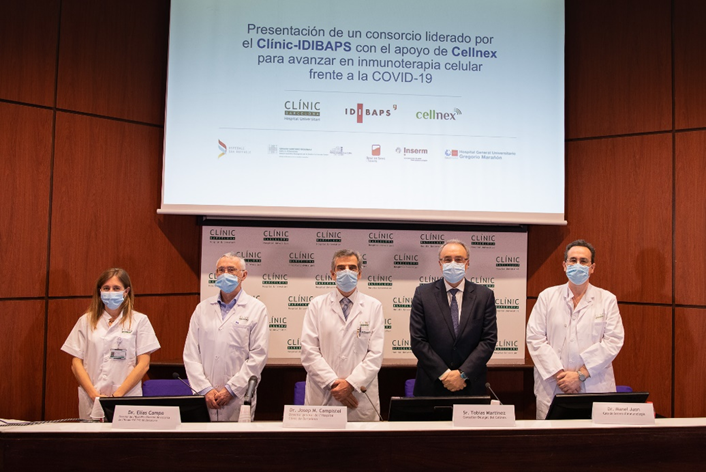
The other half of the fund is allocated to social action projects with non-governmental organisations in all the countries in which Cellnex is present to help people and groups in vulnerable situations, to help fund the purchase of protective equipment for health workers and to provide resources for the most vulnerable groups.

As part of the "Cellnex COVID-19 Relief Initiative", Cellenx has signed an agreement with UNICEF Spain with the aim of helping to facilitate equitable access to the COVID-19 vaccine in low- and middle-income countries through the COVAX mechanism.
The COVAX Mechanism is led jointly by the World Health Organization (WHO), the Global Alliance for Vaccination (GAVI), and the Coalition for Epidemic Preparedness Innovations (CEPI) with UNICEF as a key deployment partner and it represents an unprecedented logistics and health operation on a global scale. Thanks to its role as the largest supplier of vaccines in the world, UNICEF has been designated to organise the acquisition, transport and distribution of vaccines, tests and treatments, allocated to low and lower-middle income countries.
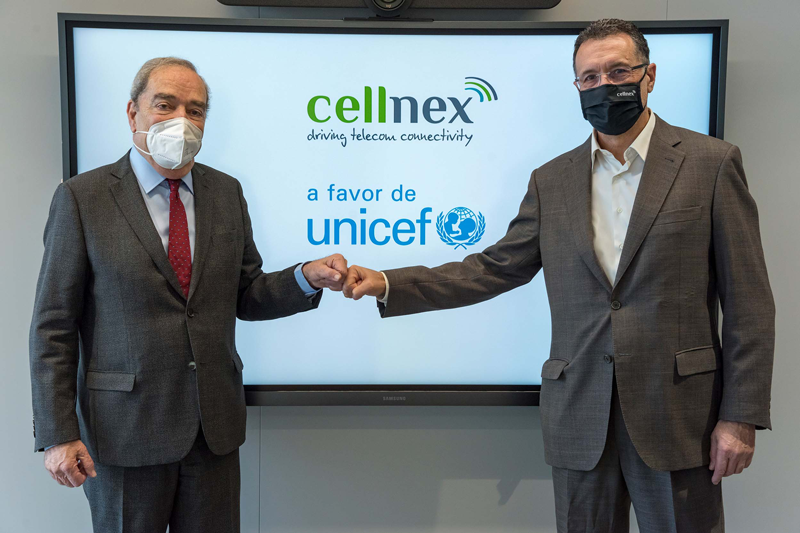
Cellnex has also cooperated in the design and deployment of ventilators for ICUs, with the aim of alleviating to the fullest extent possible the lack of this key equipment in combating the pandemic. Cellnex's contribution has been to provide real-time communication with the ventilators and data presentation on its SmartBrain platform. This solution allows patients to be monitored continuously, without healthcare workers having to go near hospitalised patients, helping to reduce the risk of infection.
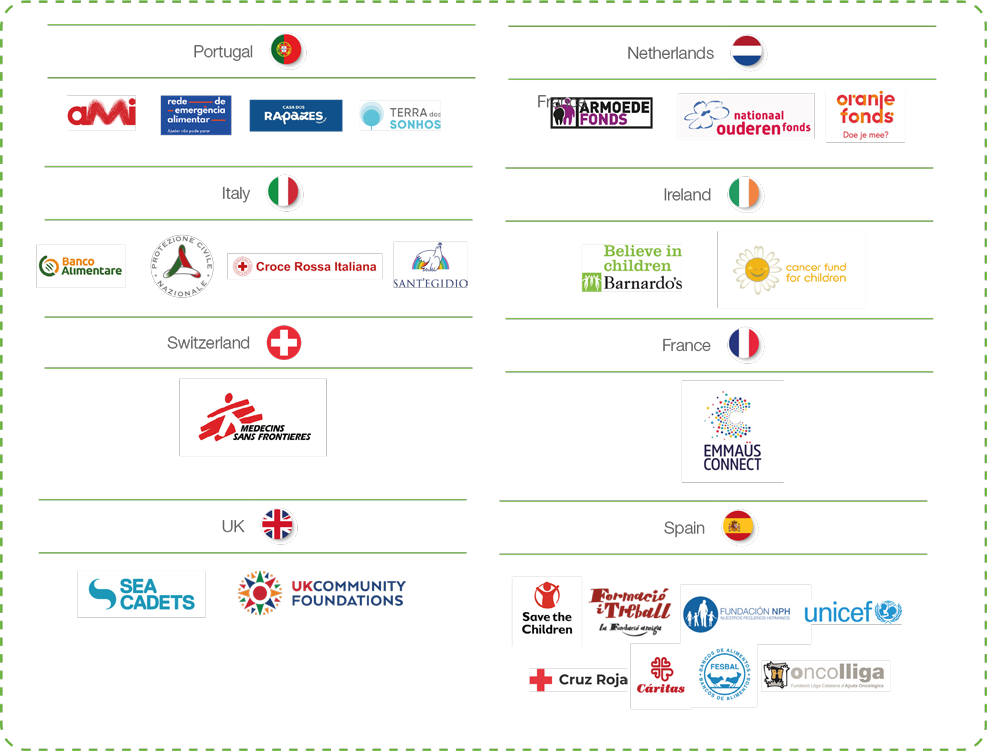

Assistência Médica Internacional (AMI) was founded in 1984 people as the driving force behind its activities. Since 1987, it has worked in 82 countries around the world and has sent hundreds of volunteers and tonnes of aid. AMI is, aware of the realities of life in Portugal, and has expanded its scope of actionsince 1994 to do everything possible to reduce the effects caused by the phenomenon of poverty and social exclusion in the country. At the beginning of the pandemic, AMI created an aid campaign called "Os amigos são para as ocasiões" to increase support for the elderly and other at-risk groups, such as cancer patients, people affected by HIV, diabetics, single-parent families and other cases of social isolation. Cellnex contributes to the cost of parcels of essential products that will be distributed to the target audience of this initiative.
Rede de Emergência Alimentar is an organisation that aims is to deliver food to people in need supporting, those who have limited financial resources and are unable to afford food which is normally distributed through social action.
Casa dos Rapazes is an institution that takes in children and young people in precarious family situations. Casa dos Rapazes used to have a car for use by the team (visiting young people's families, going to court, etc.) and to transport the young people (school visits and extracurricular activities). This car broke down during the pandemic due to intensive use, so it was necessary to replace it. Cellnex contributed to the purchase of a new car as well as supporting its activity.
Terra dos Sonhoses is an institution that helps chronically ill children, young adults in institutional care and adults with cancer problems. During the pandemic, its activity was essential, especially its programmes promoting the mental and emotional well-being of particularly vulnerable groups such as children and young people with serious illnesses, cancer patients and health professionals.

Armoede Fonds is a poverty fund set up in 2013 that provides financial support to local aid organisations so that they can continue their vital work for people living in poverty. The fund has more than 16,000 donors, providing a stable funding base for these local organisations to organise activities such as summer camps for children, sports activities and help with the purchase of fruit and vegetables for families in need. Support is also given to schools to ensure that children living in poverty also have the opportunity to get a good start in secondary school, by helping to buy either school or sports equipment.
National Ouderen Fonds (National Fund for the Elderly) is dedicated to all elderly people in the Netherlands. They offer all kinds of activities where people get to know each other so that everyone has the opportunity to age actively. Its pillars are: active ageing, inspiring an age-friendly environment and combating loneliness.
Oranje Fonds (The Orange Fund) is the largest Dutch fund in the social field. Created in 2002, after merging with the Koningin Juliana Fonds, which was created in 1948, it focuses on projects that ensure that everyone can participate in society. Support is given in the form of money, knowledge and attention.

Banco Alimentare is an organisation that supports the least privileged members of society from a social, economic, environmental and educational perspective. Banco Alimentare supplies food to charitable organisations, which in turn distribute it to people in need. It also promotes and carries out activities focused on educating about the importance of valuing food and not wasting it, as well as raising awareness on issues of poverty, food poverty, healthy diet and volunteering.
Protezione civile is the Italian Government Department in charge of coordinating the response to natural disasters, catastrophes and other events, which, need to be managed with extraordinary means due to their intensity or extent. Protezione civile has managed the COVID-19 crisis in Italy in line with the consequences suffered by the country. Cellnex's financial contribution has contributed towards the purchase of respirators and safety equipment for medical staff, as well as support in the creation of additional facilities to manage the large number of patients.
Croce Rossa Italiana, founded in 1864, is a non-profit association with the general aim of preventing and alleviating suffering, irrespective of nationality, race, sex, creed, language, social class or political opinion, contributing to the maintenance and promotion of human dignity and a culture of non-violence and peace. Since the beginning of the COVID-19 crisis, the Italian Red Cross has been at the forefront of multiple actions such as emergency response, health services, psychological support, logistics, awareness campaigns, testing and providing substantial support to crucial activities to help combat the pandemic.
Community of Sant'Egidio is a Christian community formed in 1968 in a secondary school in the centre of Rome. Over the years, it has grown into a network of communities with presence in more than 70 countries around the world. The Community pays special attention to suburban areas, bringing together men and women of all ages and conditions, united by a voluntary and free commitment to the poor and to peace.
A financial collaboration was also made to other institutions and projects such as Medici Senza Frontiere, Lega Italiana Fibrosi Cistica, Lega del Filo D'Oro and Operation Smile Italy.

Barnado is an organisation that helps children whose welfare is at risk by working with them, their families and the people around them and campaigning for children's rights. Since the COVID-19 crisis began, the charity has rapidly adapted its services, assisting 1,720 families in need of urgent support.
Cancer Fund for Children, a team of specialists providing a wide range of practical, financial and emotional support services to families affected by cancer, at home, din hospital and in their social environment.

Médecins Sans Frontières was founded in Paris in 1971 by a group of journalists and doctors. Today they are a worldwide movement of approximately 65,000 people. Médecins Sans Frontières provides medical assistance to victims of conflicts, epidemics, natural disasters or exclusion from health care. Its teams are made up of tens of thousands of health professionals, logisticians and administrative staff, united by its charter. Their actions are guided by medical ethics and the principles of impartiality, independence and neutrality. It is a non-profit, autonomous organisation, beholden to its members. During the coronavirus pandemic, its medical, logistical and health promotion staff worked on projects in the cantons (states) of Geneva and Vaud, mainly assisting vulnerable populations, refugees and elderly people.

Emmaüs Connect is an entity dedicated to the digital inclusion of the most vulnerable groups. Cellnex France and Emmaüs Connect have launched a two-year partnership project to work for the digital inclusion of the most vulnerable groups. It will organise 100 introductory computer workshops, set up 100 connection assistance services, support 100 beneficiaries through an educational programme, and participate in the opening of a new reception point. Cellnex employees will also be offered the opportunity to participate in volunteering and mentoring activities.

Sea Cadets is an organisation that works with 15,000 young people aged 10-18 in the UK. It has 400 local units with over 9,000 volunteers who enable the "cadets" to join in activities that allow them to explore the world, take a break from screens, and have role models. The platform they offer is built on the customs, traditions and values of the Royal Navy: courage, commitment, discipline, respect, integrity and honesty. Cellnex provides financial support for youth training programmes in areas such as maritime engineering, meteorology and navigation developed by the Sea Cadets across 69 local units in the southern area of England.
UK Community Foundations is a charity leading a movement of community foundations committed to positive social change in the UK through the development of "community philanthropy". Cellnex made a donation that has been distributed to six community foundations tackling digital exclusion in their communities.

Save the Children works so that millions of children have the opportunity to be what they want to be today and to dream of what they will be tomorrow. Cellnex has participated in the "At your side" project, which consists of educational intervention programmes through remote learning support and by providing them with technological tools (internet connection, distribution of tablets, etc.) focusing in particular on minors in vulnerable situations.
The Formació i Treball Foundation aims to train and employ people at risk of social exclusion and manage the delivery of clothes, furniture and other household equipment to vulnerable families. Cellnex has cooperated in the project to purchase computer equipment (mainly tablets) for vulnerable groups with the aim of preventing lack of access to technology from widening the social gap.
The Nuestros Pequeños Hermanos Foundation is committed to improving the living conditions and education of vulnerable children in Latin America. Cellnex made a financial contribution to cover the campaigns promoted by the Nuestros Pequeños Hermanos Foundation due to the health crisis.
UNICEF works so that every child around the world can enjoy their childhood without any further worries. In more than 190 countries, they defend the rights of children above all else, with passion, dedication and diligence. Cellnex has worked with the "Emergency Coronavirus" campaign that provides protective equipment and detection kits for the communities that are most at need.
The Red Cross is a humanitarian, voluntary and public interest institution. Cellnex made a contribution to the "CRUZ ROJA RESPONDE" project aimed at alleviating the effects of the COVID Crisis among the most vulnerable groups.
Cáritas Española aims to undertake the charitable and social action on behalf of the Church in Spain, through its confederated members. It promotes the comprehensive development of individuals and peoples, especially the poorest and most excluded. Since the beginning of the pandemic, the network of 70 diocesan Caritas organisations that make up Cáritas Española have been committed to supporting the most disadvantaged communities in the face of the social and health crisis caused by COVID-19. Cellnex takes part in this objective by contributing financial resources to the campaigns conducted by Càritas Catalunya and Cáritas Diocesana Madrid to alleviate the effects of the crisis.
For Cáritas Catalunya, Cellnex made a contribution to the #WeAsYou campaign, which aims to dignify the delivery of food using a wallet card and so avoid the embarrassing queues that form in many parishes and at Cáritas distribution centres. With the YO COMO TÚ Campaign, Cáritas is working to ensure that everyone can buy the products they want in any food establishment keeping with their food, family or cultural needs.
The Spanish Federation of Food Banks (FESBAL) is a non-political and non-denominational organisation, founded in 1995, which promotes the work, image and profile of the associated Food Banks in their action against hunger, poverty and food waste making use of products and distributing them to the people most in need, which also helps to improve the environment. Cellnex made a financial contribution to the campaign "La gran recogida de alimentos" (The great food collection). Cellnex also sponsors "Calle Cellnex" in the central warehouse of the Madrid Food Bank.
Fundació Oncolliga offers psychosocial support to people with cancer and their families to improve their well-being and quality of life. Cellnex bare the cost of strengthening the psychological care service in response to the pandemic.
As explained throughout chapter “3. Commitment to our employees”, for Cellnex training, and opportunities for professional development, empowerment, involvement, etc. are maxims that play a key role in the dynamics of the company. But the company also carries out numerous activities beyond its centers and groups of employees, in constant contact with society whose digitisation and modernisation form a key part of its social objectives. An example of this is Cellnex's participation in the Enterprise Challenges, as well as its partnership with various foundations.
The third edition of the Enterprise Challenges was held in 2021, a competition aimed at students taking a degree in Industrial Technologies and Economic Analysis that seeks to find appropriate solutions to specific business problems in line with the "Problem-Idea-Prototype" cycle, so that students can study the problem identified in the challenge, then develop a proposal for a solution that demonstrates its viability (MVP, Minimum Viable Product).
For the second year running, the team mentored by Cellnex earned first place among the 16 participating groups. In this totally online edition, the students accepted the challenge of improving the management of medical equipment in a hospital to achieve maximum efficiency. The result was Meditrack, a system that enables the monitoring and prioritisation of portable medical equipment in a hospital. The project aims, above all, to improve efficiency in the use of hospital equipment and to allow it to be made available quickly in the event of urgent need.
Working with ESADE Foundation: Cellnex has signed a partnership agreement with the ESADE Foundation, associated with one of the most prestigious business schools in Europe, to contribute to its Scholarship Fund to cover scholarships for two ESADE students during the academic years from 2020-21 to 2023-2024. Cellnex involvement in this programme is driven by the company's commitment tocontribute towards the progress of society by training young people. With the “Cellnex scholarship”, the company joins the effort made by ESADE to promote equal opportunities and inclusion, removing all the economic barriers to access to training for young people.
Partnership with the BEST Foundation: Cellnex made a commitment to the Barcelona Engineering and Economic Studies project this year as a sponsor company of the BEST Foundation. This new inter-university degree offered by the Polytechnic University of Catalonia (UPC), Pompeu Fabra University (UPF), Barcelona Global, and FemCat aims to train highly skilled engineers to address the challenges of a continuously changing society and equip professionals who are interested in business leadership. Cellnex will sponsor two students in a four-year commitment.
IESE: Cellnex has been an IESE sponsor company since 2017 and is involved in various projects run by the Public Sector-Private Sector Centre at the Business School.
During 2021 Cellnex has developed several social initiatives, some of which were:
The Cellnex Foundation is driven by to the Cellnex's resolute wish to go one step further towards contributing to a better connected and socially inclusive environment as a comprehensive initiative that complements the Company's ESG (Environment, Social Responsibility and Corporate Governance) strategy.
The creation of the Cellnex Foundation is Cellnex's response to boost its social commitment and offer differential value through actions based on technological connectivity solutions, aligned with the company's business model. The Foundationwas envisioned as a dynamic tool at the service of people to achieve the transformation of individual and collective realities in vulnerable situations, as well as contributing improving of the environment.
Bringing people at risk of exclusion closer to technology by promoting effective connectivity, fostering the improvement of connections in territories and spaces with distinctive heritage or historical relevance, and promoting positive solutions for the environment are the main fields of action of the Foundation.
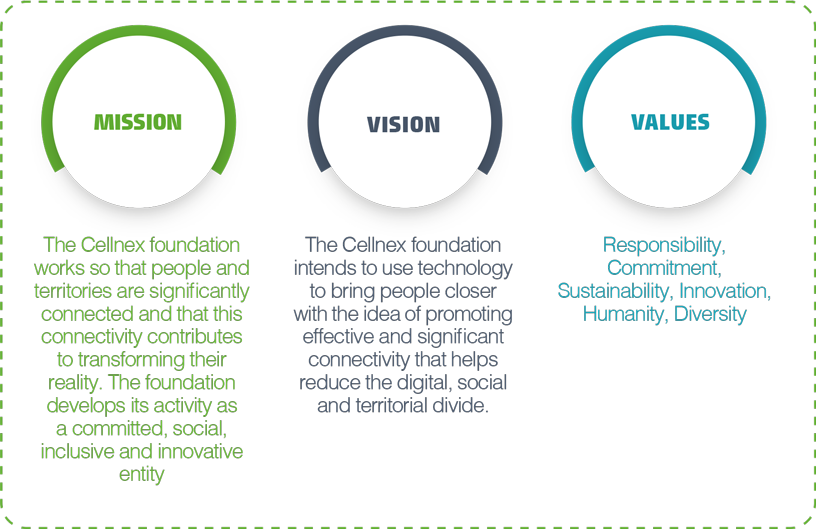
The challenge that the Foundation meets is connecting people and territories digitally and effectively, contributing to the achievement of the following Sustainable Development Goals (SDGs):
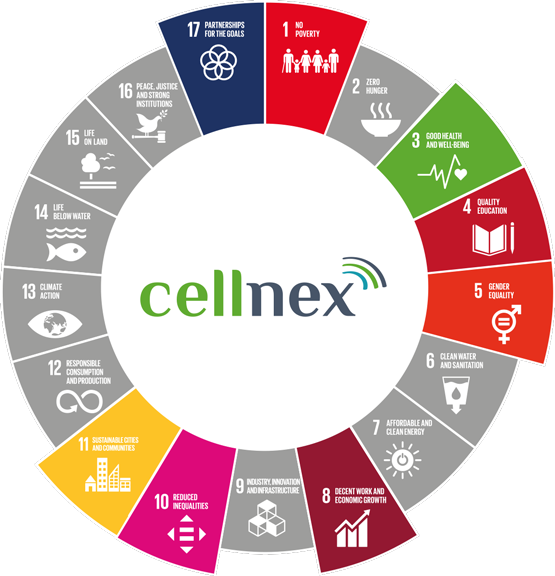
The actions undertaken by the Cellnex Foundation focus on responding to the challenges and problems detected in the Cellnex environment:
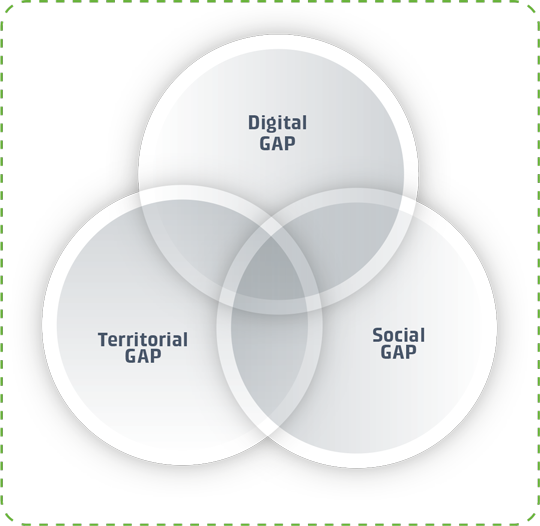
The Foundation's social contribution model is based on four pillars of action that maximise its social impact on the territory:
The strategy for implementing the Foundation's own programmes is based on the Foundation's Connectivity Master Plan, which defines the lines of regeneration by rural area to achieve the defined impact on the territory.
The Master Plan is delivered in a matrix of rural localities where the Foundation can bring connectivity and generate a significant impact through revitalisation programmes aligned with its objectives and strategy. The Master Plan proposes 6 revitalisation programmes:
In this regard, as its first project, the Foundation is working on the revitalisation of the textile colonies in the area of Puig-Reig (Berguedà, Barcelona, Spain). The objectives of the Textile Colonies pilot programme are to promote economic activity and innovation in the municipality of Puig-Reig, and the revitalisation of the industrial colonies located there. Consequently, the design principles on which the Textile Colonies pilot programme is based are: self-sustainability, digital innovation, reindustrialisation, activation and revitalisation of the territory, and conservation of industrial heritage.
In 2021, the Cellnex Foundation launched its first acceleration programme for social impact startups: the Cellnex Bridge.
The Cellnex Bridge Accelerator was created with the aim of holistically supporting startups with a high social impact through technology and connectivity to work within the aims of the Cellnex Foundation. This programme is undertaken by the Cellnex Foundation in collaboration with Innuba and AticoLab.
The Accelerator, promotes startups that work to reduce the gaps that cause inequality of opportunities of any kind. Cellnex is looking for startups that work in the field of technology and connectivity, preferably in the following areas (although not exclusively): Elderly people, Care for people, Employability, Rural depopulation, Education, Areas of low rural or urban connectivity, and Protection of vulnerable groups.
The Cellnex Bridge Accelerator offers a three-month systemic impact acceleration programme and includes:
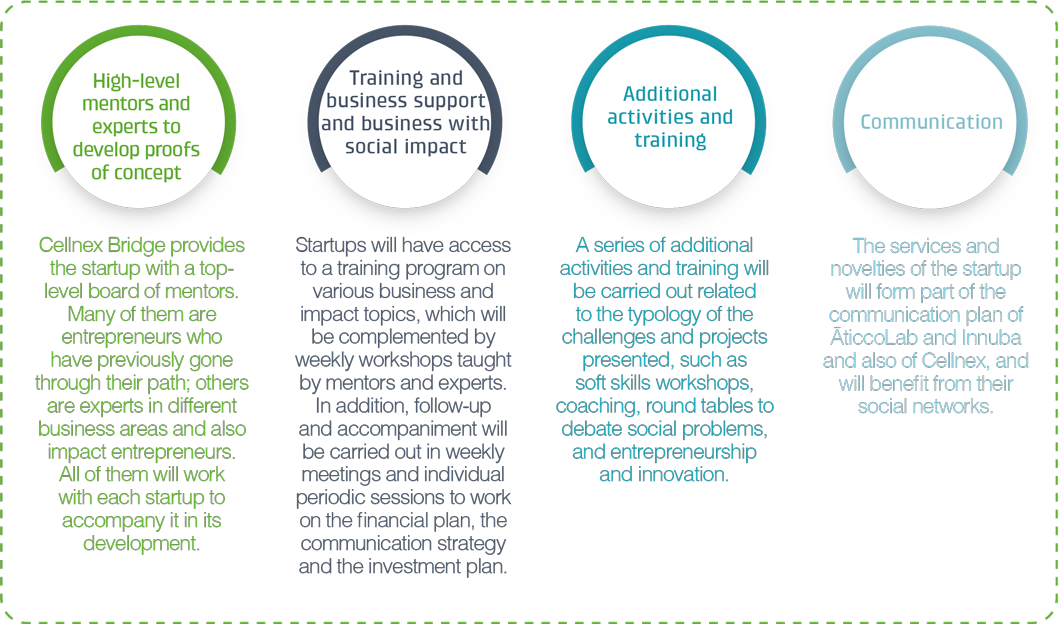
In November 2021 the three startups selected in the first Cellnex Bridge programme were announced: Voluta.coop, Nixi for Children and eAgora.

The Cellnex Foundation is creating a portfolio of activities of great social value for employees in all the countries where Cellnex is present.
Corporate volunteering is developed by drawing on Cellnex's know-how in the areas of:
In the area of Education, training and mentoring, a corporate volunteering programme has been designed called Youth Challenge. This is an education programme for young people in vulnerable situations to facilitate their entry into the labour market. The objectives of the Cellnex Youth Challenge are:
The project is managed by Cellnex and United Way España, and implemented in collaboration with the Exit Foundation, Alwa Social Entrepreneurship and the Bertelsmann Foundation, all of which specialise in promoting educational innovation and equal opportunities.
The Youth Challenge Cellnex programme harnesses the commitment of the teaching teams, the work of educators from various bodies involved and the support work offered by Cellnex volunteers, to operate in three capacities:
In addition, the students made a series of visits to Cellnex offices and network control centres in the area, which provided a number of volunteering opportunities and a more complete learning experience for the students. Students also prepared for job interviews through mock interviews. In addition, some graduating students are offered paid internships at the company, strengthening the link between the educational/training centre and Cellnex Group.
During the 2020-2021 academic year, the programme was developed in Spain (Centro Formación José Ramón Otero and IES Velázquez in Madrid, Institut La Mercè in Barcelona, and Institut Escola del Treball in Barcelona) and Italy (Istituto Tecnico Industriale Statale Galileo Galilei in Rome). For the academic year 2021-2022 the programme has also been extended to France and Portugal.

Cellnex Portugal has developed a project to promote access to employment for young people (aged 18 to 30) from families with limited resources and a low level of education through 9 mentoring sessions. The project involves the participation of 20 corporate volunteers from Cellnex Portugal.
The key objective of the Cellnex volunteers is to bridge the gap between students' training and the skills required in the workplace. The mentoring process ultimately promotes STEM (Science, Technology, Engineering and Mathematics) vocations among young people, establishing a link between Cellnex's activities and their social impact.

The 5th of December is International Volunteer Day. This day is a unique opportunity to give thanks for all the efforts made by volunteers and their organisations, as well as to promote their values and publicise the achievements they make in their communities.
The Cellnex Foundation wanted to recognise the commitment and effort of volunteers. For this reason, on 10 December 2021, all the employees were invited to have the opportunity to join in and participate in various activities with volunteering as the key pillar and the environment and sustainability the main theme. Two speakers (Koldo Villalba, biologist and guide; and Victor Küppers, writer and lecturer on motivation, passion and attitude) explained how to act as corporate and individual volunteers.
In addition, two workshops were held: one on biodiversity, where the concept was explained, the biodiversity situation in the country was outlined, the related Sustainable Development Goals (SDG 14 and SDG 15) were explained and a practical workshop on making nesting boxes from recycled materials was held; and a second workshop on Sustainable Development Goals and Climate Change, where SDG 13 "Climate Action" and how it affects Cellnex was explained, the Company's carbon footprint and water footprint were explained, consideration was given to the role of the individual in advancing towards the achievement of the SDGs and a practical workshop was held on the raising poultry with homemade materials.
The Cellnex Foundation promotes initiatives and works with other entities to develop projects with a social impact. Some of the initiatives carried out in 2021 are:
Before starting...
We use our own and third-party cookies for analytical purposes and to show you personalized advertising based on a profile prepared from your browsing habits (for example, pages visited). Click HERE for more information. You can accept all cookies by pressing the "Accept" button or configure or reject their use by pressing the "Configure" button.
ACCEPT AND CONTINUE Configure cookies